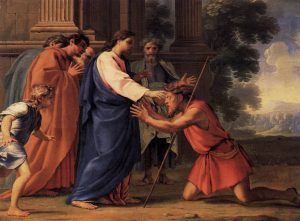Believing what you do not see
In the first reading we heard the Lord say to Samuel “Do not judge from his appearance or from his lofty stature, because I have rejected him. Not as man sees does God see, because man sees the appearance but the LORD looks into the heart.”[1] What we see, what we believe we see, is often absent from the truth.

Jesus healing the blind man
It is all too easy to fool the eyes, as any illusionist can quickly prove. A recent photograph of a dress worn by the mother of a bride has been viewed by over 28 million people, examined by a plethora of experts, and been the subject of numerous news reports all because some people say the dress has white and gold stripes while others insist that it has blue and black stripes!
What we see through our eyes is always colored by our past, skewed by what we believe we know, altered by what we do not understand, and often “seen indistinctly, as in a mirror.”[2] Even when we are confronted by the truth we often refuse to alter our perceptions because as Mark Twain once quipped, “Truth is stranger than fiction, but it is because Fiction is obliged to stick to possibilities; Truth isn’t.”
In “The Myth of the Cave”, the Greek philosopher Plato weaves a story where all of humanity lives their lives chained within a darkened cave, with nothing but shadows and illusions flickering upon a wall to define their reality. One man escapes his bonds, travels beyond the darkness of the cave, and looks upon the sun and sees the world as it truly is. When he returns and tells the others what he has seen and experienced they refuse to believe it. His truth must be mere fantasy, an illusion, the ravings of a madman, and he is summarily dismissed.[3]
How often do we dismiss or deny that which conflicts with our own perception of reality? How often are we like those who knew the beggar when he was blind and now that he could see refused to admit they knew him? Even when he said to them that it was indeed he who had been blind but could now see.
The blind man’s neighbors and the Pharisees saw with their own eyes that the one who had been blind from birth could now see, but they refused to acknowledge the truth of it. Some suggested that it was someone who closely resembled the blind man. The Pharisees, after questioning the man’s parents and the man himself, while neither admitting nor denying his miraculous healing, chose instead to focus on the one who restored his sight, Jesus. They chose to ignore the miracle that had occurred, the sight given to the man born blind, and to denigrate Jesus by saying, “This man is not from God, because he does not keep the Sabbath.”[4]
When the Pharisees threw the man out of the temple, Jesus found him and asked him if he believed in the Son of Man. When the man asked who that was, Jesus responded: “You have seen him, and the one speaking with you is he”[5] and the man immediately fell to his knees and professed his faith in him. He saw with eyes that were once blind but could now see, and he believed.
Blindness comes in many forms but seldom do we recognize any but the physical inability to see through the eyes in our head. Those who are physically blind, whether from birth or later in life, learn to adapt to their inability to see. They learn to see by sharper hearing, more sensitive touch, even a more delicate nose. Blindness that is the result of hatred, ignorance, jealousy, greed, lust, selfishness, ego or any other aberrant, sinful desire, dulls the other senses and blinds the spirit, leaving the soul unable to see all that is good.
It is one thing to deny or refuse to accept what our eyes have not seen but it is quite another to deny what we have seen. To believe what we have not seen is called faith and as Saint Augustine tells us, “Faith is to believe what you do not see; the reward of this faith is to see what you believe.” What Augustine writes is an essential element of who we are as Christians and as believers, for if we do not believe in God, whom we do not see, then we most certainly will not see him beyond the grave.
Our lives are measured by the passage of time and we cannot expect to see God until we have passed from this life into the next, but we ought to take comfort in our faith, for as Jesus told his disciples when he appeared to them after his resurrection, “Blessed are those who have not seen and have believed.”[6]
[1] 1 Sm 16:7.
[2] 1 Cor 13:12.
[3] Plato, The Republic: The Myth of the Cave.
[4] Jn 9:16.
[5] Jn 9:37.
[6] John 20:29.
